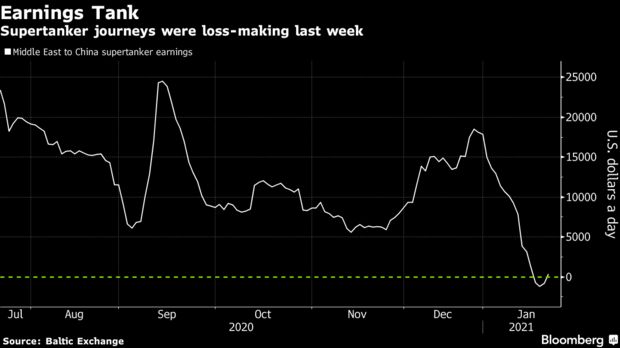Unemployed Supertankers Are Going to Get Junked on Asia’s Beaches

Image: Collected
Covid-19 is destroying the marketplace for supertankers that deliver about a fifth of the world’s crude oil. The effect may very well be booming trade on the beaches of Bangladesh, India and Pakistan, where obsolete ships head to get blow-torched and purchased for scrap.
Last week, the 1,200-foot vessels plying the industry’s busiest trade route -- from the Middle East to Asia -- effectively had to subsidize the delivery of cargoes because of what size the surplus of ships has grown.
By submitting my information, I agree to the Privacy Policy and Terms of Program.
As the vessel glut has genuinely been in place because when Covid-19 caused oil demand to collapse early this past year, it has until been recently masked by an enormous chunk of the fleet storing crude that once was surplus to requirements. Today, with Saudi Arabia and different major producers keeping millions of barrels off the market, and consumption more robust, those placed cargoes are being purchased again -- departing the tankers unemployed.
“It is hard to assume a couple of circumstances that is more against tanker owners compared to the ones right now,” said Brian Gallagher, head of investor relations at Euronav NV, owner of the world’s third-most significant fleet of supertankers. “Once you have scrap prices at these amounts that’s very beautiful, it changes the powerful for owners of elderly tonnage.”
That will see more of the vessels sent to the world’s scrapyards, according to multiple conversations with tanker-company executives, a lot of whom didn’t want to go over publicly how challenging the marketplace is becoming. Clarkson Research Offerings Ltd., a product of the world’s major shipbroker, expects about 2% of the fleet to get demolished in 2021, up from almost none for days gone by 2 yrs. Its forecast was created before the slump into adverse rates.
The scrapping might not exactly be enough to save the market in the coming weeks. The amount of oil being delivered at ocean remains far below common amounts as OPEC and its allies continue to withhold enormous volumes of creation and vessels that were used as storage through the oil market’s mammoth 2020 glut are now coming back again onto the market and looking for organization.
More importantly, scrapping is normally regarded as a tactic that stops the rot. It doesn’t generally drive a surge in costs. On Wednesday, daily revenue for supertankers sailing on the benchmark Middle East to China way were -$1,190, regarding to statistics from the Baltic Exchange in London.
The Baltic’s numbers assume fixed charges for a vessel, that can be mitigated. For case in point fuel costs may differ and ships will be able to decelerate to limit their consumption. Several of the tanker owners said they were doing this when sailing back again to the center East for cargoes.
Scrap Value
Clarksons Platou AS, a sister provider of Clarkson Analysis, estimates that ship speeds could at this moment be coming down by almost 25%.
An interval of relatively high delivery rates meant the quantity of supertankers getting demolished stayed low in the last few years. There have been just two large crude carriers, or VLCCs, scrapped this past year and four in 2019. That compares with a total of 44 across 2017 and 2018, regarding to Clarkson Research Offerings Ltd. It counts a complete fleet of 823 VLCCs.
The existing earnings malaise will force ships that are a lot more than 15 years old to consider at risk of the break-up yards of Asia, the executives said. Every five years a vessel must undergo a particular survey that costs millions of dollars, money that’s difficult to find when vessels are producing a loss.
The scrap value of a VLCC currently stands at $18.95 million, according to the latest Clarkson Research data. That’s the highest since March 2018 and may offer a further more incentive to scrap.
Even so, most owners don’t expect a restoration in earnings before second half of the entire year, when anticipations are that oil demand are going to start to snap again toward pre-coronavirus levels. Which should result in extra volumes of crude sailing over the world’s oceans.
Until in that case owners have little to cheer. Some reported as many as 15 ships being offered to pick up some cargoes in the centre East. Right now, oil that’s stored in tanks on territory is being slowly proved helpful off by refiners. That, coupled with an ever increased number of tankers time for the market after being applied to retail store oil at ocean, means any turnaround in the tanker industry won’t come overnight.
“It’s a challenging backdrop,” said Euronav’s Gallagher. “It feels as though it’s likely to be challenging for some time.”
Source: https://www.bloomberg.com
Previous Story
- Bangladesh an emerging big monetary force, says Iranian...
- Pakistan looks to improve bilateral trade
- If China no more really wants to be...
- Female participation in non-agri sector: Bangladesh better away...
- OTT streaming wars can further intensify in 2021:...
- How Bangladesh can benefit from China’s economic recovery
- Remittance more likely to grow 8 percent
- Bangladeshi, Pakistani economists under-represented at leading UK varsities